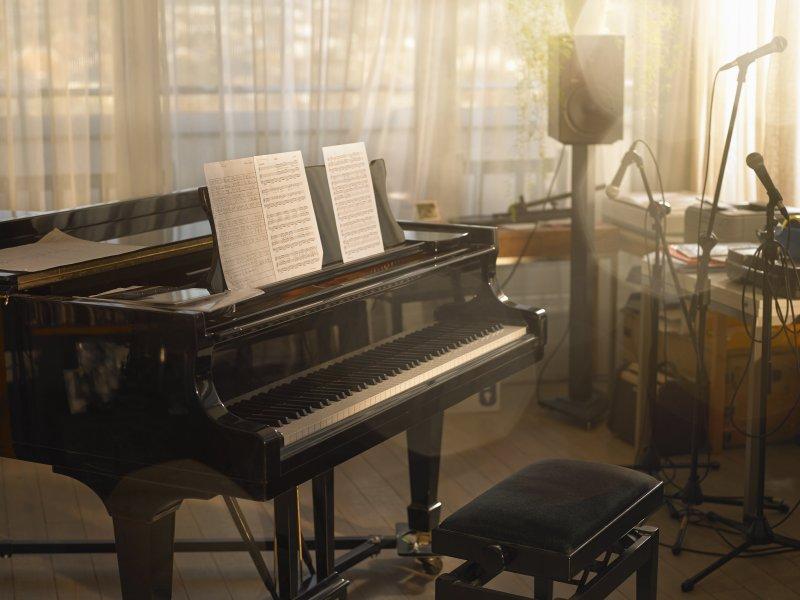You’ve got your instrument, your sheet music, and your books. You’ve found a great music teacher to guide you. But… let’s take a look at your home practice space. Could it be holding you back? Learn how to improve it with these tips from piano teacher Eric B…
If you’re a musician, you know the importance of carving out a practice space in your home. You can get creative with the space you have or dedicate an entire room to it, but either way it’s essential for developing your musical skills and progressing as an artist.
But what if your home practice space is actually holding you back? Let’s explore some common pitfalls that might be preventing you from reaching your full potential as a musician.
What Do I Need for a Rehearsal Studio?
A rehearsal studio is an essential tool for dedicated musicians preparing for live performances, recording sessions, and auditions. To ensure a great session, there are several pieces of equipment you’ll need to acquire before setting up the space:
- You’ll need instruments and stands to accommodate everyone who might be practicing.
- Microphones and amplifiers will enable sound capture and control.
- Instrument cables and audio/visual connection speakers allow you to dance across different audio sources.
- Finally, a monitoring system so everyone in the studio (including you) can hear what each instrument brings to the mix is essential!
With all these items in hand, your rehearsal studio will allow your band or ensemble to practice effectively before any big performance.
Ultimately, all you truly need in your home piano or home guitar practice space (or whatever other instrument you want to rehearse!) is a can-do attitude and your instrument of choice.
Having an instructor on hand to help address any questions or roadblocks you may encounter is smart, too. Consider signing up for music lessons. The video below can give you an idea of what you might learn:
https://www.youtube.com/watch?v=hCtgL5C-e2M
What Makes a Good Practice Room?
Whether you’re a new musician or a seasoned pro, having a good practice space is essential.
Not only must it be comfortable and conducive to learning, but also soundproofed and acoustically balanced. After all, when it comes to making music, your practice room can make all the difference. But how do you set up the perfect practice room? Read on for some tips!
Choose Your Space Wisely
The first step in creating an ideal practice room is to choose an appropriate space. If possible, try to select a location that is quiet and away from distractions — this will help keep you focused and motivated. Consider any potential noise sources in your environment such as traffic, trains, or other people in your home. You may also want to opt for a space with minimal furniture or items that could distract you while practicing.
Invest in Quality Soundproofing
No one wants their neighbors calling the police because of their loud music! Investing in quality soundproofing materials is key to avoiding any potential issues with noise levels while also providing an enhanced acoustic environment for playing music. Some of the best materials for soundproofing include foam panels, acoustic wall tiles, and floor mats (for added insulation). It’s also important to check for any air leaks around windows or doors where sound could escape into the outside world.
Optimize Your Acoustics
The goal of optimizing your acoustics is to create a well-balanced sound within the practice room itself — this means making sure that low frequencies don’t overpower higher ones and vice versa. Choose furniture pieces that absorb sound (e.g., couches) rather than reflect it (e.g., glass). You should also aim for even coverage throughout the space so that no one spot sounds too boomy or too trebly. This can be achieved by strategically placing acoustic foam panels on walls and ceilings as well as rugs or carpets on floors and other surfaces.
How to Make the Best Practice Space At Home
A few years ago I had a student who was struggling to improve. She was practicing more than I asked, but every week brought in mediocre versions of the songs I assigned. We tried different techniques for months with no success.
A few months passed and we did an online lesson when I was on tour. I was shocked to see where she was practicing: the piano was in a hallway, and her siblings were running back and forth by her while she tried to play. Because the space was too tight, she was squashed against the keys. The only light came from a bare bulb in the hallway, and there was a massive pile of toys on the piano.
This poor girl had one thing standing between her talent and becoming a great musician: a terrible practice space.
Having an amazing practice room that keeps you focused is essential to consistent improvement. Here are seven ways you can spice up your music practice space:
1. Get great lighting.
Make sure that the room you practice in is well-lit. I love practicing in naturally lit rooms, with a simple piano stand light on the piano so I can see my sheet music. If it’s too dark in the room you may fight fatigue sooner than if your room is brightly illuminated.
2. Have a cell phone shelf outside your practice room.
Get a cheap wall-mounted car key holder and place your phone on it each time you go into your practice room. This will keep you from getting distracted during practice sessions. If you place a charger by the wall holder, you’ll have the added reward of a fully charged phone when you leave.
3. Declutter.
The fewer items in the room, the less likely you’ll be to get distracted. Move all items that don’t relate to music to other rooms, and your mind will relax and focus on the task at hand.
4. Get a kitchen timer.
Now that you’ve decluttered your room, you’ll need to keep track of your practice time. Use a cheap kitchen timer to help you stay focused while you’re practicing. Take a look at bunch of great options here.
See also:
- Infographic: How to Practice Piano for Your Best Results
- 50 Little Things You Can Do to Get More From Your Guitar Practice Time
- How the Best Singers Structure Their Singing Practice
- Our 8 Best Tips for Effective Drum Practice
- 25+ Violin Practice Tips to Help You Improve… Fast!
5. Get a metronome.
Metronomes are the least expensive way to improve your rhythm, and having one by your piano or keyboard will encourage you to use it daily. Here are a few inexpensive but quality metronomes to consider.
6. Bring a water bottle and a high-protein snack.
Most instrumentalists will burn calories while playing, so make sure you keep your energy levels high. I love snacking on nuts or a protein bar while I play, and a big 32 oz. bottle of water by the piano (cap on to prevent spills) helps me stay hydrated.
7. Put a practice calendar on your wall.
I recommend keeping track of your music practice on a calendar. This will give you a visual reminder of how consistent you’ve been with your practicing.
Then, set rewards for yourself after a certain number of consecutive practices. I love getting coffee, so I go out and get my favorite cappuccino after 10 days of practice. Get creative!
Take Time to Maximize Your Home Music Practice Space
Home practice spaces have their advantages, like privacy and convenience – but they also come with some drawbacks that could prevent musicians from reaching their full potential as artists.
From lack of equipment to distractions galore (not to mention a lack of inspiration) sometimes changing up the scenery can really help get those creative juices flowing again! If this sounds like something you need right now, consider finding another space – like a professional studio – where all the necessary resources are available so that nothing holds back your creativity!
Fortunately, there’s a happy ending to my piano student struggling to learn in a hallway. After talking with my student’s parents, they made some big changes.
They converted part of the dining room in their house into a practice space, adding a special bookshelf and colorful music-themed decorations. She switched from struggling to excelling in a matter of weeks.
If you’re investing time and money into music lessons, give yourself the best shot at succeeding in the practice room. If you make the effort, it might just pay off in a lifetime love of playing music.
Editor’s Note: We also like these 12 tips from Piano Power, with additional ways to make your music practice space productive — like eliminating audio distractions, considering personality differences, and keeping acoustics in mind.
Photo by Joe Buckingham
 Post Author: Eric B.
Post Author: Eric B.Eric Barfield is a full-time keyboardist, producer, and piano teacher based in Nashville, TN. His career has included working with Dove-award winners Meredith Andrews (Vertical Church Band), and American Idol finalist Joe Banua. Learn more about Eric here!
Suzy S.

